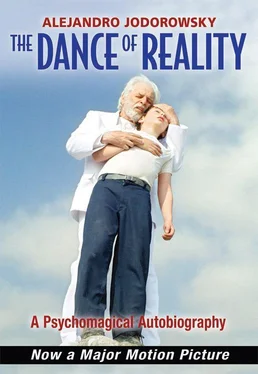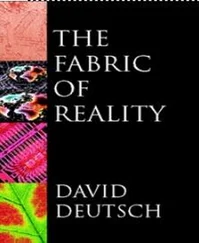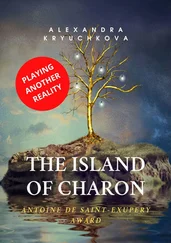He who has only hands
Helps with his hands
And he who has only feet
Helps with his feet
In this great spiritual work.
I also remembered a Chinese story:
A tall mountain cast a shadow, preventing a village at its feet from receiving sunlight. The children grew up stunted. One morning, the villagers saw the oldest man walking down the street with a porcelain spoon in his hands.
“Where are you going?” they asked.
“I am going to the mountain,” he replied.
“What for?”
“To move it away from there.”
“With what?”
“With this spoon.” The villagers laughed.
“You’ll never be able to!”
The old man answered, “I know I never will. But someone has to start.”
I told myself, “If I want to be useful, I must do so in an honest way, using my true capabilities. I will not in any way act like a clairvoyant. First of all, I cannot read the future, and second, I think it’s useless to know it when we don’t know who we are here and now. I’ll content myself with the present and focus the reading on self-knowledge, based on the principle that we do not have a destiny predetermined by any gods. The path is being created as we walk along it, and every step offers a thousand possibilities. We are constantly choosing. But who is it that makes this choice? It depends on the personality with which we have been shaped in childhood. And so, what we call the future is a repetition of the past.”
I began my Tarot reading sessions at the same time that I was writing the comic The Incal for Moebius. The more I progressed with the readings, the more I noticed that all problems have their roots in the family tree. To examine a person’s difficulties is to enter into the psychological atmosphere of his or her family. I realized that we are marked by the psychomental universe of our families. We are marked by their characteristics, but also by their insane ideas, their negative feelings, their inhibited desires, and their destructive acts. The father and mother project all their phantoms onto the expected infant. They want to see him or her do what they themselves could not experience or accomplish. Thus, we assume a personality that is not our own, but comes from one or more members of our emotional environment. To be born into a family is, as it were, to be possessed.
The gestation of a human almost never takes place in a healthy manner because the fetus is influenced by the parents’ diseases and neuroses. After a certain time, just seeing a client move and hearing a few spoken phrases was enough for me to tell the manner in which he or she had been born. (Someone who feels compelled to do everything quickly was born in a few minutes, as if with urgency. Someone who, faced with a problem, waits until the last moment to resolve it, using outside help, was born with forceps. Someone who has trouble making decisions was born by caesarean section.) I realized that the way we are born, which is often not the correct way, alters the course of our entire lives. And these bad deliveries result from our parents’ emotional problems with their own parents. The damage is transmitted from generation to generation: the possessed become the possessors, projecting onto their children what was projected onto them, unless there is a gaining of consciousness that breaks the vicious circle. We must not be afraid to explore ourselves deeply in order to confront the ill-formed part of our being, the horror of nonachievement, and shatter the genealogical obstacle that rises up against us as a barrier and obstructs the ebb and flow of life. In this barrier we find the bitter psychological sediment of our fathers and mothers, our grandparents and great-grandparents. We must learn to stop identifying ourselves with the family tree and understand that it is not in the past: on the contrary, it is alive, present within every one of us. Every time we have a problem that seems to us to be individual, the whole family is involved. At the moment we become conscious, in one way or another, the family begins to evolve — not only the living members, but also the dead ones. The past is not set in stone. It changes according to our point of view. We have a different understanding of ancestors whom we consider heinously guilty of altering our mentality. After forgiving them, we should honor them, which is to say, know them, analyze them, dissolve them, reshape them, thank them, love them, and finally see the “Buddha” in each and every one of them. Everything that we have achieved spiritually could have been done by any one of our relatives. The responsibility is immense. Any fall drags down the whole family, including future children, for three or four generations. Children do not perceive time in the same way that adults do. What seems to an adult to last an hour, children experience as if it lasts for months, and it marks them for their whole lives. As adults, we tend to reproduce the abuses we suffered during childhood, either on other people or on ourselves. If I was tortured yesterday, then I keep on torturing myself today, becoming my own tormenter. There is a great deal of talk about sexual abuses suffered during childhood, but we tend to overlook intellectual abuses, which imbue the child’s mind with insane ideas like perverse prejudices and racism; emotional abuses that include deprivation of love, contempt, sarcasm, verbal aggression; material abuses like lack of space, abusive changes of territory, lack of clothing, and improper nourishment. There are also abuses of the being, which may include not being given the opportunity to develop one’s true personality, having one’s life planned out as a function of one’s family history; being forced into an alien destiny, not being seen for who one is, being made into a mirror of someone else, being desired to be someone else, being born a boy to parents who wanted a girl or vice versa; not being allowed to see what one wants to see; not being allowed to listen to certain things; not being allowed to express oneself; or being given an education consisting of the implantation of limits. As for sexual abuse, the list is long, as long as the list of accusations: “I married out of obligation because your mother was pregnant with you; you have been a burden to us; I left my career because of you; you are selfish to want to live your life; you have betrayed us; you let yourself surpass us and achieved what we could not.” Family history is full of incestuous relationships, repressed or not, as well as homosexual urges, sadomasochism, narcissism, and social neuroses, which are reproduced as a legacy from generation to generation. This can sometimes be seen in names. One client wrote, “You suggested that I clarify my unconscious incestuous urges with my brother. You were right. My brother’s name is Fernando, and the father of my children is also called Fernando. But this can also be found in my genealogy; my mother has a brother called Juan Carlos, and she married a Carlos. It was the same for my grandmother: her brother was named José and she married a José, and her father (my great-grandfather) was also called José.”
When did all this begin? I often see people burdened by problems dating back to the First World War because a great-grandfather returned from the front with lung disease caused by toxic gases, which caused him emotional disturbances, an inability to fulfill himself, moral devaluation. And when the father is weak or absent, the mother becomes dominant, invasive, and is no longer a mother. The absence of a father brings about that of the mother. The children grow up with a thirst for caresses, which translates into repressed anger that extends through several generations. The lack of touch is the greatest abuse suffered by a child. All this garbage affects us, even if it is not conscious. The relationships between our parents and our aunts and uncles trickle down onto us. For example, Jaime hated Benjamín, his younger brother. I was Jaime’s younger child. I became a screen onto which his brother was projected. This allowed him to vent his bottled-up hatred onto me. Even if we know nothing of rapes, abortions, suicides, shameful events, incarcerated relatives, venereal diseases, alcoholism, drug addiction, prostitution, or countless other secrets in our families, we still suffer from all of it, and sometimes we repeat it. A boy is named René, which means “reborn,” and feels himself invaded by a vampire-like personality, not knowing that he was born after another sibling died. A father gives his daughter the name of the woman who was his first love, and this dooms her to playing the role of his girlfriend for life. A mother gives her son the name of his maternal grandfather, and the son fruitlessly tries to be like that grandfather in order to satisfy his mother’s incestuous desires. Or, in a family with many daughters, one of them in desiring to give the father an heir to carry on his name will have a one-night stand with a strange man, a foreigner who will then return to his home country, leaving her pregnant. Symbolically this child is engendered by God; she is imitating the Virgin Mary. The Virgin was possessed by her father; he introduced himself completely into her womb, changed himself into his own son, then created a man-god pairing. Together forever, the two now reign in heaven, as if in a marriage. If a single mother gives birth to a son who, metaphorically, is the child of her father, and calls him Jesús or Emmanuel or Salvador, or in fact the name of any saint, then that child will live an anguished life, feeling obligated to be perfect. The sacred texts, when misinterpreted, play a nefarious role in this family catastrophe. Extremist religions create sexual frustrations, illnesses, suicides, wars, and unhappiness. Perverse interpretations of the Torah, the New Testament, the Koran, and the Sutras have caused more deaths than the atomic bomb.
Читать дальше












